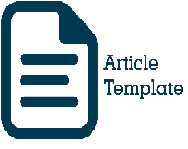The Role of Islamic Banking Financing for Afforadable Housing in Realizing Sustainable Development: An Analytic Network Process (ANP) Method
Abstract
The government of the Republic of Indonesia is to provide appropriate affordable housing programs for low middle incomes. Based on the physical attributes and traditional social aspects of the low-middle income household, and social environment in the residential area, as well as their contribution to economic growth. This paper evaluates the level of prioritization of Islamic Banking Financing for affordable housing program of low-middle income families in Realizing Sustainable Development. Simultaneously, the research offers access to sustainability measurement of Islamic banking to finance affordable housing on both the social and environmental dimensions. This research utilizes An Analytic Network Process (ANP) Method to evaluate and select Sustainable Development Goal Ranking The results of this study are found that Sustainable Development Goal 8: Promote inclusive and sustainable economic growth, employment and decent work for all, is most important for Islamic banking financing for affordable housing program in Realizing sustainable Development comparing to the Sustainable Development Goals (SDGs) of goas number 9: Build resilient infrastructure, promote inclusive and sustainable industrialization and foster innovation, and Goal 11: Make cities and human settlements inclusive, safe, resilient and sustainable. Furthermore, according to the experts of Islamic Housing financing, the objective of Islamic banking financing for Affordable Housing In Realizing Sustainable Development are; to protect low-income people and people in vulnerable situations and reduce the risk for slum dwellers.
Keywords
Full Text:
PDFReferences
Abubakar Siddique, M., Rashid, A., & Tahir, U. (2023). Factors affecting the credibility of islamic banking Sharī’ah approvals: Perception-based empirical study. Borsa Istanbul Review, 23(2), 426–442. https://doi.org/10.1016/j.bir.2022.11.010
Alamdari, A. M., Jabarzadeh, Y., Adams, B., Samson, D., & Khanmohammadi, S. (2023). An analytic network process model to prioritize supply chain risks in green residential megaprojects. Operations Management Research, 16(1), 141–163. https://doi.org/10.1007/s12063-022-00288-2
Alhajri, M. F. (2022). Housing challenges and programs to enhance access to affordable housing in the Kingdom of Saudi Arabia. Ain Shams Engineering Journal, 13(6). https://doi.org/10.1016/j.asej.2022.101798
Battisti, F. (2023). SDGs and ESG Criteria in Housing: Defining Local Evaluation Criteria and Indicators for Verifying Project Sustainability Using Florence Metropolitan Area as a Case Study. Sustainability (Switzerland), 15(12). https://doi.org/10.3390/su15129372
Borbely, D. (2022). The impact of housing subsidy cuts on the labour market outcomes of claimants: Evidence from England. Journal of Housing Economics, 57. https://doi.org/10.1016/j.jhe.2022.101859
Choi, S.-Y., Lee, Y.-S., Kim, E.-J., Kim, S.-H., Lee, J.-S., & Cho, J.-S. (2019). Analysis of Sustainable Development Goals(SDGs) and ‘Housing’ Contents in Middle School Technology·Home Economics Textbooks. Korean Home Economics Education Association, 31(1), 115–136. https://doi.org/10.19031/jkheea.2019.03.31.1.115
Disalvo, R. W., & Yu, J. H. (2023). Housing Affordability and School Quality in the United States. Journal of Housing Economics, 60. https://ssrn.com/abstract=3803977Electroniccopyavailableat:https://ssrn.com/abstract=3803977
Ezennia, I. S. (2022). Insights of housing providers’ on the critical barriers to sustainable affordable housing uptake in Nigeria. World Development Sustainability, 1, 100023. https://doi.org/10.1016/j.wds.2022.100023
Habitat for Humanity. (2021). Housing and the Sustainable Development Goals The transformational impact of housing.
Ibrahim, H., Salama, A., Awwaad, R., & Aboukalloub, B. (2023). Housing dynamics for sustainable urban development in Greater Doha. Journal of Engineering Research. https://doi.org/10.1016/j.jer.2023.100152
Karim, S., Naeem, M. A., & Abaji, E. E. (2022). Is Islamic FinTech coherent with Islamic banking? A stakeholder’s perspective during COVID-19. Heliyon, 8(9). https://doi.org/10.1016/j.heliyon.2022.e10485
Kazak, H., Uluyol, B., Akcan, A. T., & İyibildiren, M. (2023). The impacts of conventional and Islamic banking sectors on real sector growth: Evidence from time-varying causality analysis for Turkiye. Borsa Istanbul Review, 23, S15–S29. https://doi.org/10.1016/j.bir.2023.09.004
Li, K., Qin, Y., & Wu, J. (2020). Recent housing affordability in urban China: A comprehensive overview. China Economic Review, 59. https://doi.org/10.1016/j.chieco.2019.101362
Madah Marzuki, M., Nik Abdul Majid, W. Z., & Rosman, R. (2023). Corporate social responsibility and Islamic social finance impact on banking sustainability post-COVID-19 pandemic. Heliyon, 9(10). https://doi.org/10.1016/j.heliyon.2023.e20501
Magableh, G. M., & Mistarihi, M. Z. (2022). Applications of MCDM approach (ANP-TOPSIS) to evaluate supply chain solutions in the context of COVID-19. Heliyon, 8(3). https://doi.org/10.1016/j.heliyon.2022.e09062
Maulina, R., Dhewanto, W., & Faturohman, T. (2023). The integration of Islamic social and commercial finance (IISCF): Systematic literature review, bibliometric analysis, conceptual framework, and future research opportunities. Heliyon, 9(11), e21612. https://doi.org/10.1016/j.heliyon.2023.e21612
Moghayedi, A., Phiri, C., & Ellmann, A. M. (2023). Improving sustainability of affordable housing using innovative technologies: Case study of SIAH-Livable. Scientific African, 21. https://doi.org/10.1016/j.sciaf.2023.e01819
Selerio, E., Caladcad, J. A., Catamco, M. R., Capinpin, E. M., & Ocampo, L. (2022). Emergency preparedness during the COVID-19 pandemic: Modelling the roles of social media with fuzzy DEMATEL and analytic network process. Socio-Economic Planning Sciences, 82. https://doi.org/10.1016/j.seps.2021.101217
Thomas L. Saaty. (2016). Decision Making With The Analytic Network Process : Economic, Political, Social and Technological Applications with Benefits, Opportunities, Costs and Risks.
Zhang, G., Xu, K., Liu, Z., Huang, R., Li, B., & Wang, R. (2023). Policy-based initiatives on promoting China’s affordable housing: Challenges and opportunities. In Developments in the Built Environment (Vol. 16). Elsevier Ltd. https://doi.org/10.1016/j.dibe.2023.100222
DOI: https://doi.org/10.46899/jeps.v12i1.520
Article metrics
Refbacks
- There are currently no refbacks.
Copyright (c) 2024 Jurnal Ekonomi dan Perbankan Syariah

This work is licensed under a Creative Commons Attribution-NonCommercial-ShareAlike 4.0 International License.
Indexed By:
Address: Jl. Raya Bojongsari, Pondok Rangga, Kec. Sawangan, Kota Depok, Jawa Barat 16517, Indonesia










